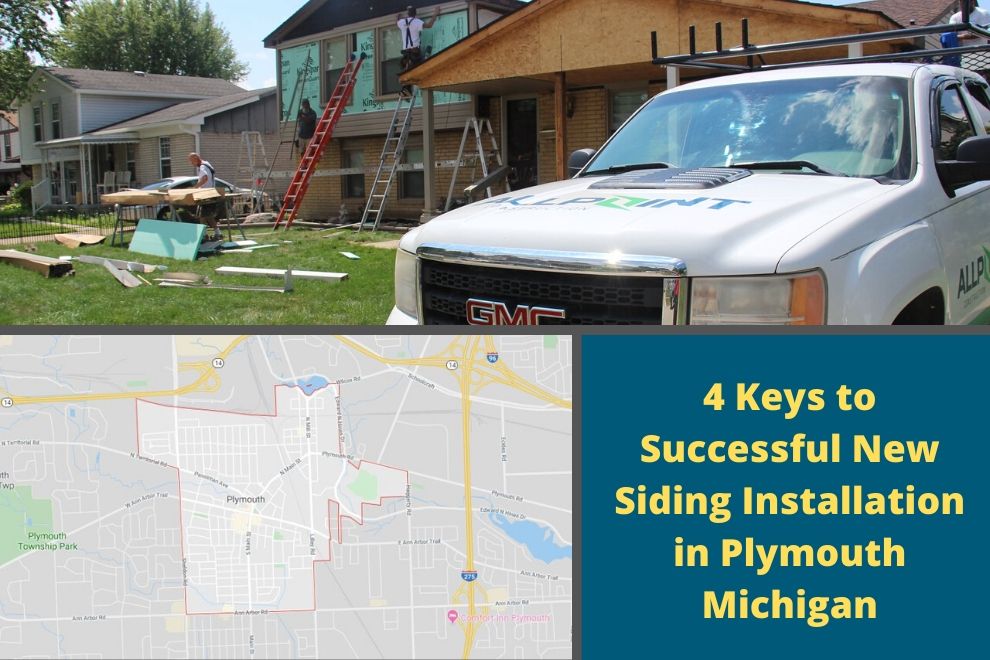4 Keys to Successful New Siding Installation in Plymouth Michigan
Vinyl siding has earned its place as one of the best ways to cover the outside of a Michigan home. This enduring popularity stems from vinyl siding’s numerous advantages, including its durability, aesthetic versatility, and relatively low cost compared to other varieties of cladding. Yet to get the most from vinyl siding, it must be installed according to a strict set of protocols.
If siding is not installed correctly, it may fail to protect your home from water and other destructive elements. Such siding also stands a far greater chance of coming loose or succumbing to damage. If you would like to learn more about how a true professional approaches this job, read on. This article outlines four of the keys to successful new siding installation in Plymouth, Michigan.
Choosing the Right Nails
The panels in a vinyl siding system are fastened to the walls of your home using nails. Of course, not just any nails will do for this purpose. In order to ensure secure, long lasting results, the nails must meet three key criteria.
Material
As with roofing nails, the type of metal used to construct a vinyl siding nails is of vital importance. Plain steel nails will quickly succumb to corrosion, increasing the risk of siding failure. Instead, a smart contractor will always use some form of corrosion-resistance nails: either stainless steel, aluminum, or galvanized steel.
Stainless steel nails offer the greatest amount of protection against corrosion, however they also carry the highest price tag. Aluminum nails are an affordable option with excellent corrosion resistance. Yet aluminum nails usually can’t handle weight as well as steel nails, and may sag or bend as the years go by.
For this reason, galvanized steel nails remain perhaps the most popular option. A protective layer of zinc keeps corrosion at bay. The steel core provides the kind of strength needed for long-term stability. And galvanized steel nails tend to be far more cost-effective compared to stainless steel.

Dimensions
Contractors must also pay close attention to the dimensions of the vinyl siding nails they use. The nail’s length will dictate how well it remains in place as time goes on. Ideally, a vinyl siding nail should penetrate the wall of your home to a depth of no less than 3/4″.
Another important criterion is the diameter of the shank. If the shank is too narrow, even a nail of the appropriate length may come loose as time goes on. 1/8″ is generally considered the minimum diameter necessary for a good vinyl siding nail. Finally, nails with wider heads are always preferable, since they will do a better job of holding the siding against the wall.
Capping the Corner Posts
As you can probably guess, corner posts are installed anywhere two walls of a home come together at a corner. The goal of a corner post is to block off the ends of the siding, thus preventing water from getting beneath the vinyl. Without corner posts, the vulnerable walls of a home would soon develop wood rot and other serious structural issues.
Unfortunately, corner posts can lead to other problems if not installed correctly. The cavity of a corner post provides an all too convenient home for invasive pests like squirrels, mice, and wasps. Such creatures are not only a nuisance, but their nests can lead to other types of damage over time.
To keep corner posts pest-free, smart contractors cap off the post ends. This simple task doesn’t involve any additional parts. Instead, a slit is made in the outer corner of the post, allowing the contractor to fold the two resulting flaps down on top of one another, thus sealing off the end of the post.
Putting Flashing Around Windows
One of the more challenging aspects of installing vinyl siding involves working around windows and other protrusions. If a contractor is not careful, water can easily work its way beneath the edge where the siding intersects the window frame. To help protect against water damage, common practice dictates that a special component J-channel be installed along the sides of a window.
J-channel consists of a piece of vinyl specially shaped to safely conduct water away from your home. Many newer windows actually contain built-in J-channels. Yet J-channels alone cannot provide complete protection against water damage. During periods of heavy rainfall, water may escape the J-channel and find its way behind your siding.
For that reason, professional siding contractors will always install protective flashing around windows. These pieces of molded sheet aluminum are designed to sit over the nailing fins of a window. There, the flashing provides a total weather seal, preventing water from intruding behind the siding and damaging the walls of your home.
Installing Long Strips of Siding First
Windows, doors, and other interruptions to the plane of a wall present difficulties in other ways as well. Instead of using full-length strips as on the rest of the wall, contractors must cut down the siding to fit on either side of the window. This part of the operation doesn’t present too much trouble.
Yet inexperienced contractors often make mistakes when deciding which piece of siding to install first. Namely, they often install the shorter pieces on either side of the window before installing the longer pieces that go above and below it. This often leads to siding that looks noticeably “off,” since the panels on either side of the window often fail to sit at the exact same places.
Fixing this kind of problem is far more difficult than installing the siding correctly the first time. A true professional always installs the full-length pieces of siding first. This approach makes it far easier to line up the shorter pieces of siding in the correct manner, thus ensuring that the siding will come out level all the way across the wall.
Installing vinyl siding may be a seemingly simple task, yet it involves numerous challenges that only those with the correct blend of experience and knowledge can overcome. If the time has come for new siding installation on your home in Plymouth, Michigan, please contact the industry experts at Home Pros Plymouth at 734-548-9911.


